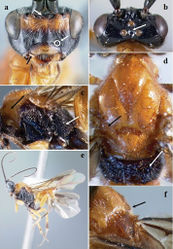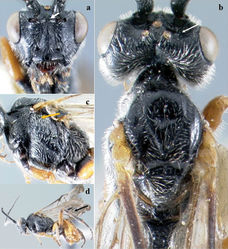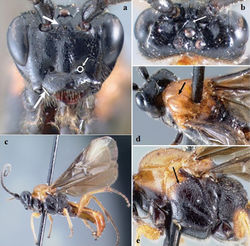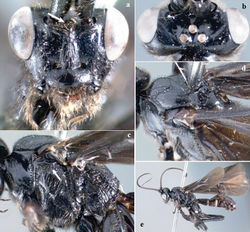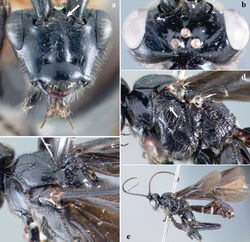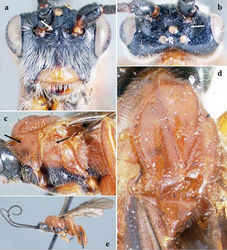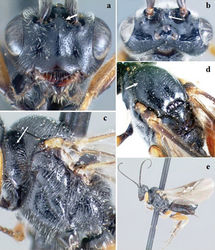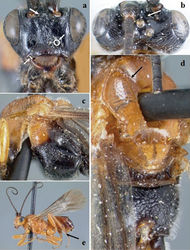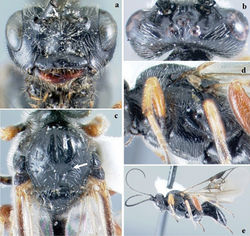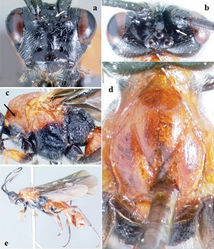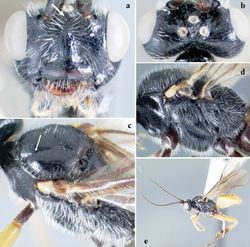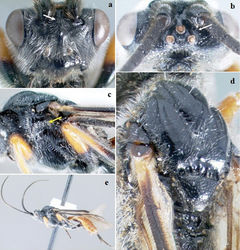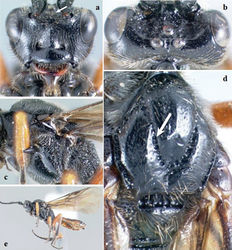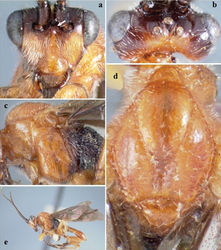Crassomicrodus
| Notice: | This page is derived from the original publication listed below, whose author(s) should always be credited. Further contributors may edit and improve the content of this page and, consequently, need to be credited as well (see page history). Any assessment of factual correctness requires a careful review of the original article as well as of subsequent contributions.
If you are uncertain whether your planned contribution is correct or not, we suggest that you use the associated discussion page instead of editing the page directly. This page should be cited as follows (rationale):
Citation formats to copy and paste
BibTeX: @article{Figueroa2011ZooKeys142, RIS/ Endnote: TY - JOUR Wikipedia/ Citizendium: <ref name="Figueroa2011ZooKeys142">{{Citation See also the citation download page at the journal. |
Ordo: Hymenoptera
Familia: Braconidae
Name
Crassomicrodus Ashmead, 1900 – Wikispecies link – Pensoft Profile
- Crassomicrodus Ashmead 1900[1]. Type species Microdus fulvescens Cresson 1865[2], designated by Ashmead 1900[1] [Examined].
- Epimicrodus Ashmead 1900[1]. Type species Microdus divisus Cresson 1873[3], designated by Ashmead 1900[1] [Examined].
- Crassomicrodus Ashmead= (Epimicrodus Ashmead) synonymized by Bradley 1916[4].
Diagnosis
Crassomicrodus species can be distinguished from other agathidines with the following combination of characters: simple tarsal claws, without basal lobes, apicolateral pegs of the hind tibia are hair-like, labio-maxillary complex not elongate; mandible with two teeth; and metasomal tergum 1 smooth.
Description
Head. Transverse or triangular; area between antennal sockets with a median pyramidal-shaped elevation or transverse; gena not bulging to distinctly bulging; labio-maxillary complex not elongate, mandible with two teeth, antenna with 25 to 43 flagellomeres.
Mesosoma
Pronotum surface smooth or punctuate; notauli from lacking to impressed; anterolateral edges of scutellum with or without a small acute projection; lateral scutellar depression from smooth to crenulate; dorsal surface of propodeum from rugulose to reticulate rugose; subalar lobe separated from mesopleuron by a wide or narrow groove; metapleuron from smooth to reticulate rugose; inner spur of hind tibia from 0.47 to 0.78 times longer than basitarsus; tarsal claw without basal lobe; outer apex of the hind tibia without flattened pegs; forewing vein R1 0.47–0.70 times longer than RS; crossvein r arising before or beyond middle of stigma. Metasoma. Metasomal median tergite 1 smooth; apical width 1.78–3.92 times longer than basal width; ovipositor sheaths and ovipositor variable in length; metasoma 1.00–1.42 times longer than mesosoma.
Key to the New World species of Crassomicrodus Ashmead
Species descriptions of Crassomicrodus
Taxon Treatment
- Figueroa, J; Sharkey, M; Nápoles, J; García, J; Martínez, A; López-Martínez, V; Pineda, S; 2011: Revision of the new world genus Crassomicrodus Ashmead (Hymenoptera, Braconidae, Agathidinae), with an identification key to species ZooKeys, 142: 27-75. doi
Other References
- ↑ 1.0 1.1 1.2 1.3 Ashmead W (1900) Classification of the ichneumon-flies or the superfamily Ichneumonoidea. Proceedings of the United States National Museum 23: 110-152. doi: 10.5479/si.00963801.23-1206.1
- ↑ Cresson E (1865) Catalogue of Hymenoptera in the collection of the Entomological Society of Philadelphia, from Colorado territory. Proceedings of the Entomological Society of Philadelphia 4: 297-299.
- ↑ Cresson E (1873) Descriptions of North American Hymenoptera, No.5. The Canadian Entomologist 4: 52-53.
- ↑ Bradley J (1916) Taxonomic notes on Agathinae (Hymenoptera-Braconidae). Psyche 23: 139-140.
Images
|
